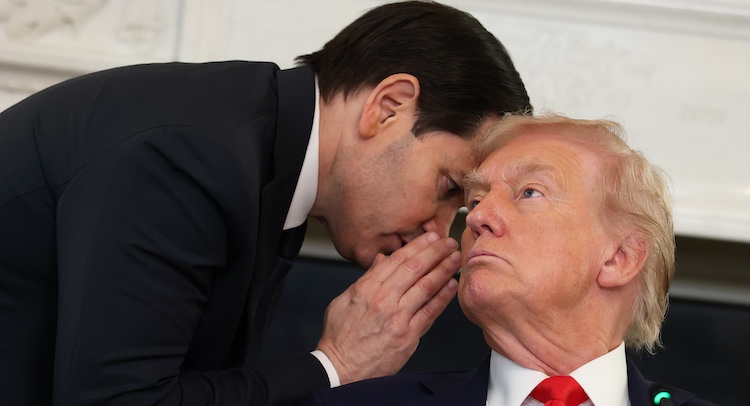The emerging deal between Israel and Hamas, brokered by President Trump and his negotiating team, has the potential to reinvigorate the West thanks to two of its achievements, one tangible and the other ideological.
The tangible achievement is Israeli victory. Militarily, of course, Israel has defeated Hamas. But in chess, the most common stalemates occur when one player has only his king left on the board. It is precisely that stalemate that Hamas and its backers, as well as some European leaders, tried to bring about.
From the beginning, Israel sought the war’s end—not just the end of this round but the end of Hamas’s ongoing decades-long war. The return of the hostages, an agreement that requires Hamas’s own financial and diplomatic patrons to force it out of government, and the demolition of the terror group’s military patrons can plausibly end the war. And that is what has happened: Israel defeated Hamas, wrecked Iran, and Trump convinced Qatar and Turkey of the need for regime change in Gaza.
An Israeli victory is crucial for the free world. In its monstrous acts on October 7, Hamas had either established a cautionary tale or a new model of strategic disruption. A defeat of Hamas means Israel has paid the steep price to inoculate the rest of the West from this virus—so long as they actually want to be inoculated.
One of the clearer indications of this is the silence from Hamas supporters among Western politicians and activists. Gazan civilians are celebrating in the streets; Israelis are celebrating in the streets. “Pro-Palestinian” groups are not celebrating. Al Jazeera isn’t celebrating. Prominent anti-Zionist media figures aren’t celebrating. The end of the war is in sight, and these rancid grifters never wanted the war to end unless it ended in a sea of Jewish blood.
Peace was the furthest thing from their minds. They aren’t celebrating the prospect of peace because they consider peace to be an Israeli victory. And they are not wrong.
The second, and more ideological achievement of the deal is the vindication of a concept that never used to need vindication among the men and women of the free world: that peace requires sacrifice, that it comes at a cost, that it must be earned.
Brief periods of calm while the enemy decides when next to carry out mass murder is not peace, it is captivity. Peace is when the enemy cannot simply decide to carry out mass murder.
The European leaders’ approach to “peace” was, essentially: Please stop fighting for a few minutes so I can get reelected. The shame of France’s Emmanuel Macron, of the UK’s Keir Starmer, of Spain’s Pedro Sanchez and others cannot be understated.
But that is not all of Europe. German Chancellor Friedrich Merz has walked a difficult diplomatic tightrope but has done it well, never throwing Israel’s existence under the bus of European populism. He is surrounded by European leaders with little regard for freedom and democracy, however, and those leaders need to see Israeli victory.
Starmer, Macron, and others who fetishize weakness insisted that “peace” meant giving in to terrorists’ demands. Their version of peace was to recognize a state of Palestine that doesn’t yet exist and half of which is in the hands of Hamas. They believe that peace comes through laziness, through empty declarations, through magical thinking, through kissing the feet of one’s pursuer.
In fact, peace requires hard work. In this case, it required an Israeli and American military alliance willing to neutralize threats emanating from Iran. It required American support for Israeli actions in Yemen, Lebanon, and Syria. And it required the mobilization of U.S. military assets in the Gulf region.
Peace is possible at this point only because the president of the United States ignored the isolationists chirping in his ear that the days of American strength were over. Whatever happens now, we are at least closer to ending the conflict than we have been, and that was made possible by military action.
Canada joined the Europeans who weren’t willing to work for peace. But the United States resisted the pull of laziness, of managed decline, of wishful thinking and decadent weakness. And so there is a chance for peace.
Will this lesson be learned? Not as widely as it should be. But the lesson has been demonstrated, and that is what is most important.

